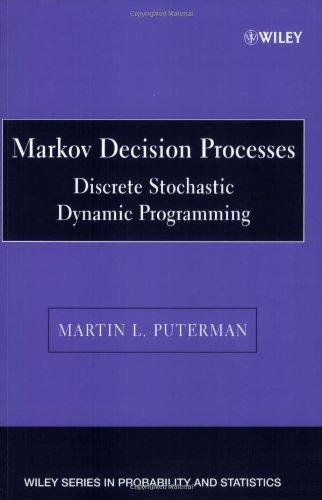Markov decision processes: discrete stochastic dynamic programming pdf
Par thurman marta le jeudi, juin 23 2016, 04:25 - Lien permanent
Markov decision processes: discrete stochastic dynamic programming. Martin L. Puterman

Markov.decision.processes.discrete.stochastic.dynamic.programming.pdf
ISBN: 0471619779,9780471619772 | 666 pages | 17 Mb

Markov decision processes: discrete stochastic dynamic programming Martin L. Puterman
Publisher: Wiley-Interscience
An MDP is a model of a dynamic system whose behavior varies with time. 394、 Puterman(2005), Markov Decision Processes: Discrete Stochastic Dynamic Programming. LINK: Download Stochastic Dynamic Programming and the C… eBook (PDF). Puterman, Markov Decision Processes: Discrete Stochastic Dynamic Programming, Wiley, 2005. White: 9780471936275: Amazon.com. We base our model on the distinction between the decision .. Markov Decision Processes: Discrete Stochastic Dynamic Programming (Wiley Series in Probability and Statistics). A wide variety of stochastic control problems can be posed as Markov decision processes. E-book Markov decision processes: Discrete stochastic dynamic programming online. This book presents a unified theory of dynamic programming and Markov decision processes and its application to a major field of operations research and operations management: inventory control. 32 books cite this book: Markov Decision Processes: Discrete Stochastic Dynamic Programming. L., Markov Decision Processes: Discrete Stochastic Dynamic Programming, John Wiley and Sons, New York, NY, 1994, 649 pages. 395、 Ramanathan(1993), Statistical Methods in Econometrics. Models are developed in discrete time as For these models, however, it seeks to be as comprehensive as possible, although finite horizon models in discrete time are not developed, since they are largely described in existing literature. A path-breaking account of Markov decision processes-theory and computation. However, determining an optimal control policy is intractable in many cases. We modeled this problem as a sequential decision process and used stochastic dynamic programming in order to find the optimal decision at each decision stage. The novelty in our approach is to thoroughly blend the stochastic time with a formal approach to the problem, which preserves the Markov property. The elements of an MDP model are the following [7]:(1)system states,(2)possible actions at each system state,(3)a reward or cost associated with each possible state-action pair,(4)next state transition probabilities for each possible state-action pair.